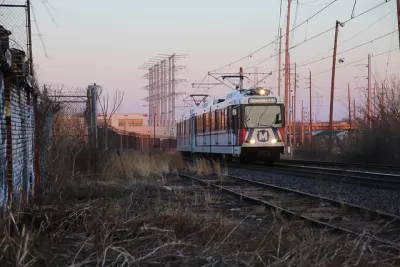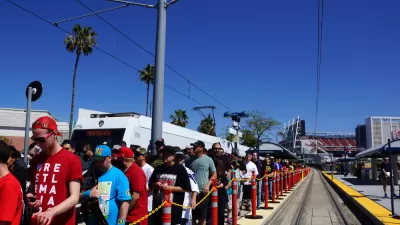American policymakers could improve the effectiveness of infrastructure projects by focusing on five key elements.

Despite policy differences, there are some major "principles that can help us end up with good infrastructure," writes Alex Marshall on Governing.com. In a nutshell, he says, "we take too long to build infrastructure that costs too much, is clunkily designed, is tied too closely to private profit and does not play well with other systems." Yet "good infrastructure is good for cities, states and their citizens; bad infrastructure is bad for them." Marshall lays out five principles for good infrastructure, which come down to the importance of five key factors:
- Cost: "we pay several times more than other advanced nations to build transit infrastructure."
- Time: projects that should take years take decades due to regulatory holdups and other delays.
- Connections: seamless networks are the key to creating truly useful, effective transit systems.
- Design: better design can lead to faster, cheaper construction, yet "we lag behind other countries" in the design of basic infrastructure.
- Ownership: oversight is important, particularly when it comes to major infrastructure. "Even the best-designed and swiftly built infrastructure will turn bad if we give one or two private companies total control over them."
Newly appointed Transportation Secretary Pete Buttigieg "has said that he will push a 'fix-it first' strategy, which is a good principle, even if it is not popular with the private development community that profits from new construction." Marshall argues that, along with basic fixes, infrastructure investment has to plan for the long term.
FULL STORY: What Are the Five Principles of Good Infrastructure?

Maui's Vacation Rental Debate Turns Ugly
Verbal attacks, misinformation campaigns and fistfights plague a high-stakes debate to convert thousands of vacation rentals into long-term housing.

Planetizen Federal Action Tracker
A weekly monitor of how Trump’s orders and actions are impacting planners and planning in America.

In Urban Planning, AI Prompting Could be the New Design Thinking
Creativity has long been key to great urban design. What if we see AI as our new creative partner?

Portland Raises Parking Fees to Pay for Street Maintenance
The city is struggling to bridge a massive budget gap at the Bureau of Transportation, which largely depleted its reserves during the Civd-19 pandemic.

Spokane Mayor Introduces Housing Reforms Package
Mayor Lisa Brown’s proposals include deferring or waiving some development fees to encourage more affordable housing development.

Houston Mayor Kills Another Bike Lane
The mayor rejected a proposed bike lane in the Montrose district in keeping with his pledge to maintain car lanes.
Urban Design for Planners 1: Software Tools
This six-course series explores essential urban design concepts using open source software and equips planners with the tools they need to participate fully in the urban design process.
Planning for Universal Design
Learn the tools for implementing Universal Design in planning regulations.
Gallatin County Department of Planning & Community Development
Heyer Gruel & Associates PA
JM Goldson LLC
City of Camden Redevelopment Agency
City of Astoria
Transportation Research & Education Center (TREC) at Portland State University
Jefferson Parish Government
Camden Redevelopment Agency
City of Claremont





























